
20 minute read
Charles Kratz, Dean of the Library, to Retire After 28 Years

With the beginning of a new academic year comes new beginnings and endings. With some melancholy, I share with you the news that this will be my last semester at the Weinberg Library and the University. I plan to retire this coming December after 28 years of service as dean. My tenure at the Library, at the CTLE and at the University has been exceptional due in the most part by my great fortune to work with an extraordinary Library faculty and staff as well as an always supportive University faculty, administration and staff. I have dedicated my time at the University to making the Weinberg Library and the CTLE the best in our region of the country and to advocating always for both organizations and their staff. A leader is only as good as the people he or she gets to work with and, in this respect, I have been blessed a thousand-fold. I will miss my friends and colleagues greatly but look forward to having more time to relax, read, teach, volunteer and hopefully spend some winter months each year at our condo in Jupiter, Florida. I considered myself most fortunate to have become a member of the University of Scranton family and to have worked with all of you.
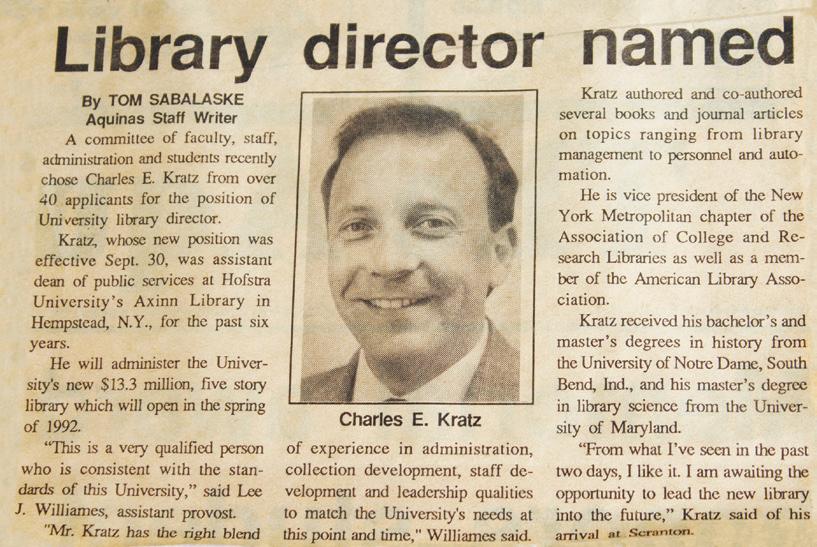
(1991) Library Director Named The University of Scranton Aquinas newspaper from 1991 announcing Charles Kratz as the Library’s new director.
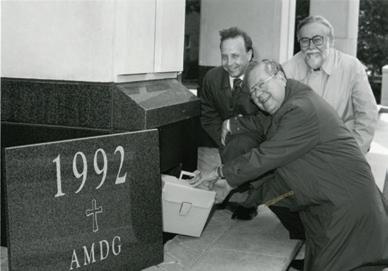
(1992) Dedication of Weinberg Memorial Library Library Dean Charles Kratz with former University President J. A. Panuska, S.J., and former provost Richard Passon adding a time capsule to the exterior pillar of the library at its dedication in September 1992.
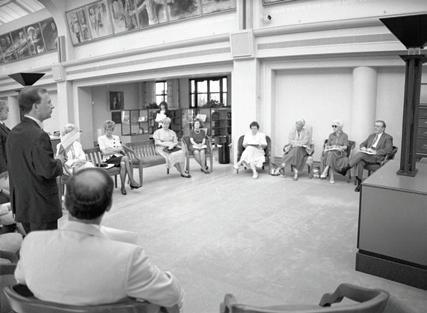
(1994) Inaugural Members of the Friends Committee Dean of the Library Charles Kratz greets the first meeting of the Friends of the Weinberg Memorial Library Board, June 20, 1994.

(1999) Distinguished Author Award Dinner Distinguished Author Award dinner. Rev. Royden B. Davis, S.J., President of the Friends of the Weinberg Memorial Library Board, and Dean of the Library Charles Kratz.
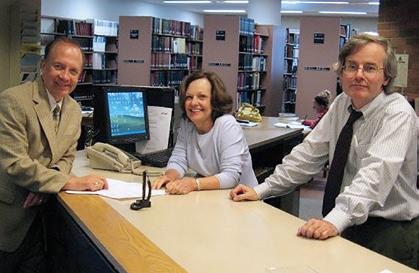
(2008) Dean Kratz Visiting the Research Desk Dean Charles Kratz visiting Betsey Moylan and Kevin Norris at the Research Desk.
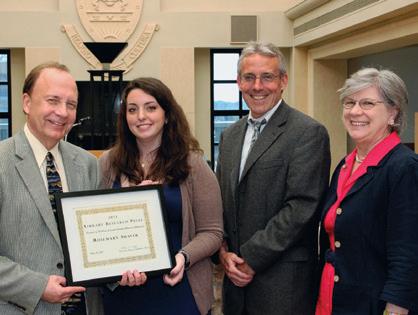
(2011) Inaugural Bonnie W. Oldham Library Research Prize Reception The Weinberg Memorial Library inaugurated the prize in 2011 to recognize excellence in research projects that show evidence of significant knowledge of the methods of research and the information gathering process, and use of library resources, tools and services. In 2017, the prize was named for Prof. Emerita Bonnie W. Oldham, who had founded the prize at the University in 2011. The 2011 Inaugural Library Research Prize reception honored Rosemary Shaver, the winning applicant, with her paper titled Pennsylvania’s First Civil Rights Movement: 1639-1900. Left to right: Charles Kratz, dean of the library; Rosemary Shaver, the Library Research Prize winner; Brian Conniff, Ph.D., dean of the College of Arts and Sciences; and professor emerita Bonnie W. Oldham.
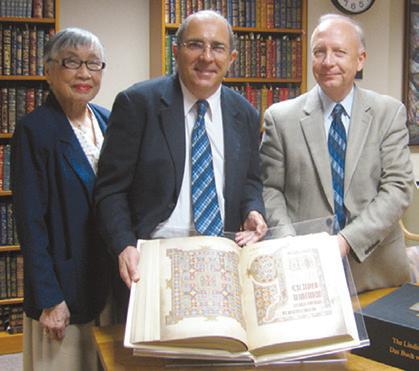
(2013) Lindisfarne Gospels Facsimile Donation In 2013, Special Collections received an extraordinary gift in honor of the 20th anniversary of the Library. Dr. Midori Yamanouchi, Friends of the Weinberg Memorial Library board member, provided funding for the acquisition of a fine art facsimile of the Lindisfarne Gospels. Created circa 715-720 AD in a monastery at Lindisfarne off the coast of England, the original Lindisfarne Gospels is at the British Library in London and is considered one of the most important and best-preserved early medieval, illuminated manuscripts. The fine art facsimile was produced in 2002 by Faksimile Verlag of Luzern Switzerland. Pictured (left to right): Dr. Midori Yamanouchi, Friends of the Weinberg Memorial Library board member; Michael Knies, special collections librarian; and Charles Kratz, dean of the Library.
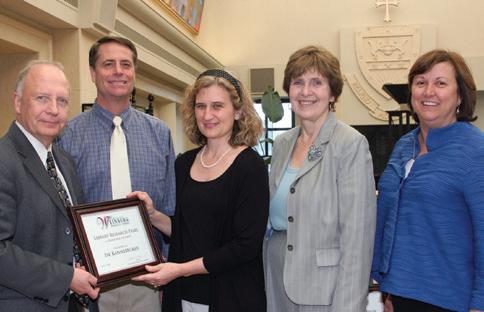
(2013) Library Research Prize Reception The 2013 Library Research Prize Reception honoring Ise Kannebecker and her winning graduate submission, “Exploring the Effects of a Longer Music Listening Session on Reducing Postoperative Pain: A Research Proposal.” Pictured (left to right): Charles Kratz, dean of the Library; W. Jeffrey Welsh, Ph.D., dean of the College of Graduate and Continuing Education; Ise Kannebecker, winner in the graduate category; Dr. Margaret Zalon, supporting faculty member in the Nursing department; and Debra Pellegrino, Ed.D., dean of the Panuska College of Professional Studies.

(2014) Jay Nathan Inaugural Lecture The Inaugural Annual Jay Nathan, Ph.D., Visiting Scholar Series, “Kazakhstan & Central Asia: History, Culture, Politics & Economy,” took place on April 2, 2014, at the Weinberg Memorial Library. Seated, from left: Charles Kratz, dean of the library and information fluency; Galiya Umarov, wife of the Kazakhstan Ambassador to the U.S.; Ambassador Umarov; and Dr.Nathan. Standing (from left): W. Jeffrey Welsh, Ph.D., dean of the College of Graduate and Continuing Education; Patricia Harrington, Ed.D., former chair, nursing; Daniel West, Ph.D., chair, health administration and human resources; Michael Mensah, Ph.D., dean of the Kania School of Management; Mary Elizabeth Moylan, chair, Library; Darla Germeroth, Ph.D., associate dean of the College of Arts and Sciences; and Dana Masalimova, second secretary, political affairs.
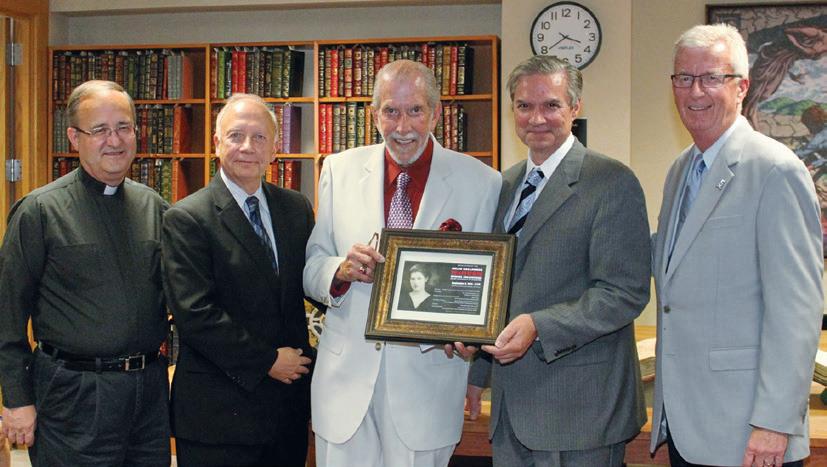
(2014) McHugh Special Collections Dedication Ceremony In 2014, Brian E. McHugh announced an estate gift to the Weinberg Memorial Library in memory of his mother, Helen Gallagher McHugh. On September 2, 2014, Special Collections held a dedication ceremony to honor this gift and the memory of Mrs. McHugh. Mr. McHugh is a member of The Friends of the Weinberg Memorial Library Board and an active member of the Luzerne County Historical Society. Left to right: Rev. Ronald McKinney, S.J.; Dean of the Library Charles Kratz; Brian McHugh ’59; former University Provost Donald R. Boomgaarden, Ph.D.; and Gary Olsen, former vice president for University Advancement.

(2014) Springer Electronic Collection Donation Friends of the Weinberg Memorial Library Board Vice President Mary McDonald and Dean of the Library Charles Kratz view the Springer Electronic Book Collection, an acquisition funded by Dr. and Mrs. Herbert McDonald in honor of the Weinberg Memorial Library’s 20th anniversary.
Charles Kratz, Dean of the Library, to retire

Charles Kratz
At the end of December 2019, Charles Kratz, dean of the Library, will retire after 28 years at the Weinberg Memorial Library. Frank Conserette (FC), editor of Information Update, recently interviewed Dean Kratz (CK) about his career milestones and upcoming plans for retirement.
FC : Please start by telling us about your career in libraries. What was it about librarianship that interested you? When did you start your career in librarianship?
CK : I started in librarianship in 1974. I graduated from the University of Notre Dame with a degree in history in 1973 and then got my master’s degree in history. After my years at Notre Dame, I had thought about going on to get a Ph.D. in history and actually was accepted to Catholic University’s doctoral program. I ran into a friend who was at the University of Maryland in the graduate program there in library and information science, and he suggested I come over and look at the program. He was also working at the research library, which was called McKeldin Graduate Library at the time. He said there was an opening in the Humanities Reference Room, so I went to look at the program and curriculum and to inquire about the position. I thought about it long and hard. The problem with graduating with a Ph.D. in 1975 or 1976 was that the field was totally crowded and would have been virtually impossible to get a job teaching in history at that time. The library and information science program at the University of Maryland provided me some other opportunities. The program had a provisional admittance so you can take one course to see if you liked it. I took what was called the Pro Seminar, which was taught by Professor David Batty, who was a well-known professor at McGill University and was visiting at Maryland for that seminar. It was just a great course, so I got admitted completely. Then I went to McKeldin Library and got the job in the graduate Humanities Reference Room. I worked there part-time while I got my degree. I guess the reason, to go back to the history piece, was I was always interested in research and that I thought the library and information science field would allow me, particularly if I focused on academic librarianship, to pursue my interests in research. It has certainly held up. If you asked me some of the things I might regret, I do not know whether I should have gotten a Ph.D. in history at the time. I miss not doing that and just did not have an opportunity later in my career because once you begin practicing, it becomes more and more difficult to do the degree, particularly if you are going into administration. FC : I understand you were at Hofstra prior to the University. CK : I was at Hofstra for six years as the assistant dean of Public Services before I came here in ’91. After a few years in the position, I started looking in the New York area at positions of directors or dean, but it was really competitive at that time so I began looking outside of the New York Metropolitan area. This position of Library director was open a year and a half before it came open again when I applied for it. I had thought about applying for it the first time, but I was four maybe four-and-a-half years at Hofstra at that point and thought it was still too early. I was surprised to see it come on the market again so I thought, “Well, I might as well take the chance and see.” It was not that long a distance between Hofstra and here, and it would be a good opportunity to move because I knew at that point, they were building a new library building here that was already underway.
FC : What was it about The University of Scranton that made you stay the rest of your career?
CK : Well, the mission, the care of the whole person and how that is part of our mission. We do outreach to the community-at-large, especially to the Northeast Pennsylvania community. I thought that was really unique because when I was at Hofstra, the Library was very strict about who can use the Library. In fact, to use the Library, you had to pay a fee of $100 a year. I thought what The University of Scranton offered in terms of the reciprocal borrowing with the Lackawanna County Library System was unique and key to what the Library can contribute to the Jesuit mission. I liked that collaboration is very significant to our work and contributions to the University mission. What kept me here? To be honest, I had two very hot opportunities to leave, and they did not pan out. As much as I would love to say that I would have stayed if I had one of those opportunities work out, I probably would have left because one was Villanova and the other Drexel University. It would have taken me to the Philadelphia area, and I think it would have been interesting to work down there.
In addition to the mission, the other thing I found attractive to staying here is that the Jesuits are very committed to education. We know that, but it really comes through in terms of what libraries do. Another thing is that we have had over my 28 years consistently strong Library faculty and support staff. The other thing that was quite attractive to staying here was creating the CTLE, the Center for Teaching and Learning Excellence. That organization is now over 15 years old, and it was a really unique opportunity to build that organization from scratch and make sure that the Weinberg Library developed close working relationships between the Library and the CTLE.
FC : What would you say are some of your other greatest accomplishments here at the Library? What are you most proud of?
CK : I am most proud of advocating for faculty status for librarians. They had had it at a previous point in our history but it was taken away. That status had just come back when I arrived in ’91, so it was really important to me to advocate strongly for the Library faculty and also the dean’s and associate dean’s positions to be part of the administration. One of the things I am most proud of is that we are very visible and seen as strong advocates on the campus because of our status. That has really been key to what we have been able to do. I have been fortunate as we have been able to recruit many really good people over the years. I think a dean is only as strong as the people you get to work with. We have probably put much more effort into recruitment than most places do, and I think it pays off in the end.
Some of the individual accomplishments are the founding of the Friends of the Library 25 years ago, which we are celebrating a big anniversary this year. Father Panuska, who was University president at that time, asked me to do it. It just took off, and we have been blessed with really strong leadership in that organization over the years. The Friends of the Library is significant to me because it’s a fundraising piece for us, allowing us to work with the community-at-large to fundraise for the Library. At the 20th anniversary when we did fundraising, the University and the Friends raised over a million dollars for the Library. And now, they just committed a gift last week of $100,000 to the Library’s second floor renovation project. That’s significant, probably the biggest gift they’ve given to us in terms of a project over the years. Father Roy Davis, a Jesuit who was the first president of the Friends of the Library, wanted a strong fundraiser group for the Library, but he also wanted a group that would support and advocate for the Library and do what we are doing now, which is take a building that opened in ’92 and start to do renovations twenty-seven years later.
We have also done a great deal with the Jay Nathan Visiting Scholar Lecture Series that we started in 2014. I worked with Professor Bonnie Oldham in the creation of the Library Research Prize in 2011. Those have been significant as well. We have also done strong outreach, not only to our own community of faculty, staff and students, but to the larger Scranton community.
FC : Outside of your responsibilities as dean of the Library, I understand you also teach classes. Can you tell us about your experiences as an instructor?
CK : When I first came here in ’91, I wanted to teach, and I approached the History department and the writing program because I had that writing concentration in my master’s degree. The writing program asked me to teach before anybody else did. I stuck with it because I was particularly interested in working with the various writing directors over the years, and it is important that Library does a great deal of work with first-year students. Now, we have a faculty librarian for student success for the first-year program. Teaching in that program has kept me in tune with not only what that first-year program is doing but also working with students. The most important thing for me is that I always wanted to see, and continue to want to see, things through the eyes of students. In my Master of Library and Information Science, at least when I was there many years ago, there was not an emphasis to always look at it through the eyes of your patron or your students. I think its critically important that when you plan things and start to make changes, you try to look at services and resources through the lenses of students. Teaching in that classroom helps me to do that by giving me the ability to converse with students about what they think. Not that I am going to hold everybody to this, but I think the idea of administrators teaching is a really good thing because it gives all of us opportunities to explore with students, something we normally would not get to do. It also gives us a chance to work with the Library faculty, who provide information literacy classes for the courses that we are teaching. It has been really important for me as an administrator to be out there with students, hear their feedback and get a sense of what frustrates them, particularly about Library research, because we think it looks pretty easy.
FC : Many of us in the Library know that you are also engaged in numerous activities across the campus and to the profession. Can you tell us more about your service activities and what they mean to you?
CK : Service is very important to our mission as a Jesuit institution. It has been important for me to establish relationships on campus, and going back to that point I made earlier about advocacy for the Library on campus, it is important that we be willing, particularly the person in my position, to give back to the University and the community-at-large. Right now, for instance, I am co-chairing the Strategic Enrollment Planning group on Student Support with Registrar Julie Ferguson. Our working group is focused on student support. She and I have been doing that for the past year, and it is really important because again it brings us, particularly me, to the table in terms of working on various projects that may be in the future for student support on campus. The other thing that is really important is to be seen as a leader on campus, and when you have opportunities like that, to take them.
I am on my fourth major opportunity to chair a major search committee for the university. I chaired the searches for the associate provost a couple of years ago, the one for the chief information officer, and the previous College of Arts and Sciences dean about 10 years ago when we were fortunate enough to have Dean Brian Conniff join us. Now, I am on my last leg here chairing the current College of Arts and Sciences Dean search. Somebody asked me the other day, “Why don’t you just take it easy?” But, it is really important for the Library to be seen as leaders on campus. My vision for the Library is that we are always seen on campus as leaders and that when asked, we want to serve.
Most of my professional service has been to the American Library Association (ALA). Many of the Library faculty do their work more locally, regionally or on a state level. My attention has always been to ALA because I really particularly enjoyed over the years serving in different capacities there, including the ALA Executive Board from 2007 to 2010 and the ALA Council, the operating body of the organization, for 12 years. What I liked about the ALA, and one can say this about the Pennsylvania Library Association, too, is that you get the chance to work with more than just academic libraries. That is critical because we never want to be so closedminded that we cannot realize we can learn from our public librarian colleagues, special librarian colleagues and even school librarian colleagues. That has given me perspective on my work, particularly fundraising, because there are many interesting things public librarians do in terms of fundraising and fundraising boards. I started early, similar to what you’ve done, in terms of getting into emerging leader groups, particularly with the New Members Roundtable years ago, and then moved myself through the organization. I am now finishing my career working with some roundtables because I think that’s where the heart and soul of ALA is right now in terms of grassroots opportunities for librarians, particularly new librarians. My interests right now are intellectual freedom, sustainability and social responsibilities of the profession, which are all things I am dealing with in terms of the roundtables right now. In terms of one of the questions coming up about retirement plans, I am not going to pull out of ALA. I have decided as long as I can afford it, I am going to continue to attend and be active because I think there are continuing opportunities, even for retired members, to play a part in the national association. In fact, currently I am serving on the National Search Committee for the next ALA executive director.
FC : We have talked about some of your major accomplishments, your legacy here at the Library. What are some of the biggest changes you’ve seen in the Library in the 28 years you have been here?
CK : Obviously in the near beginning, the Library went through an immense change because we moved from Alumni Memorial Hall, which now houses other departments on campus, to the Weinberg Memorial Library. It has been interesting to watch a building that opened in ’92 have to change and have to change in some respects rather quickly because when we opened in ’92, we still had not planned for enough technology in the building. When I arrived in ’91, the steel was already up, but we still needed to make many changes. I realized that we probably could not convince the architects to make that many changes, so probably five years in, we had to make more changes to advance technology. As it turns out, we did make changes and shifted things around more quickly. Now, we are in a different place where we really need to modernize the building.
The other thing that was significant was when my position was elevated to an academic dean in the mid ‘90s, around when the CTLE was coming on board. I was hired in ’91 as the Library director, but felt it was important for the position overseeing both the Library and CTLE to be an academic dean so that the two organizations had a voice at the table on campus. That being said, I was required by the union contract to actually apply for my position again, but this time be interviewed according to a faculty handbook search. That was interesting, too, to interview for your own position.
Advocacy for libraries and library funding has become increasingly more important, not just here on this campus, but for the field of librarianship in the future. We as academic librarians, public librarians and school librarians, need to advocate at regional, state and national levels by speaking to our representatives and explaining what we do and why we are so unique. It is incredibly important for librarians across the board to continue being advocates for funding.
FC : What do you see as the role of the librarian in the future?
CK : I think the role of librarian will be someone who is very much an information seeker but more and more willing to go out to the classroom and be embedded in courses. That is tough for us because we do not have a huge staff, so you have to choose very carefully. I think there will be a tendency to embed librarians in the future. For us, the Library will have to decide if we are going to do that and which courses are the most important to consider for that model. But I think the model of the embedded librarian is something that you are going to have to work with.
The other thing for librarians is making sure that we have an enhanced discovery layer for the online catalog. Librarians, as information seekers, are going to be responsible for providing those discovery tools. It is difficult to get people to search beyond Google, but with better discovery layers, online catalogs would be vastly improved. The other thing we need to focus on is the digital access to collections. I think we have done a good job at starting to build a digital services department here at the Library. We have had two great librarians leading that effort, but I think in the future the more digital access you can provide, the stronger access to information will be and the easier research will be. The challenge will always be prioritizing what you do next. But, at the same time, what do you do about the digital native, someone who is not computer literate, does not have the wherewithal to have access to a computer, and does not go to the public library for that access, which many people do. That’s something ALA is discussing right now; if you push all this in that direction, you still need to handle the digital native in some way and provide access to them.
FC: So, retirement. What are your plans? CK : I am hoping to relax a little bit and visit with our friends more. We hope to travel. We are going to be going to Portugal next summer on a river cruise and then to Australia and New Zealand in 2021 on an ocean cruise. I will probably do some volunteer work, particularly with other kinds of libraries helping them fundraise. We have a condominium in Jupiter, Florida, near Palm Beach, which was my father’s, so maybe a month or two in Florida next winter to see what that is like and if we like it. We thought we would keep the condo for retirement and see if we like it, and if we do not, we can always sell it. But it is an oceanfront condo, so we had better try it first! FC : Sounds like retirement is going to have a nice view.
CK : It is going to have a nice view! I think it is going to be fun. I have not talked to anybody who has retired recently that has much time on their hands, so I am not worried about having time on my hands. Maybe worrying a little about the stock market, but that anybody would worry about. I think it’s going to be fun. That is what I am hoping it will be and to do what I can, particularly while we are healthy.
FC : Do you have any concluding remarks or words of wisdom to share with us as you go into your golden years of retirement?
CK : You know what, I think I said it when I sent a note out to the staff, and I mentioned it earlier in this conversation. I have been blessed by having some really wonderful people to work with. Not everybody gets to work with a couple of generations of librarians and staff, so it has really been important to me to have done that and to have worked with them. One of the reasons I have decided to retire at this time was I thought the Library is in a pretty good place. We have hired a whole new cohort of librarians. We have excellent people in the other administrative positions, so it was a good time to probably have a transition year and look for my successor. But I would never want to dismiss how fortunate I have been to work with the people I have worked with, and I should not say just here at the Library, but also the CTLE and across campus. It is funny. You are only as fortunate, you are only as successful, and you are only as good as the quality of people you have the opportunity to work with, and you are only going to be a strong leader if you realize that. The quality of my staff over the years has been extraordinary. My thanks to all of them. That’s my parting remark.
FC : Well said. Surely, you will be missed. Thank you for taking the time to meet with me for this discussion. On behalf of myself and the Library, we wish you the best. Thank you.
CK: Thank you.

